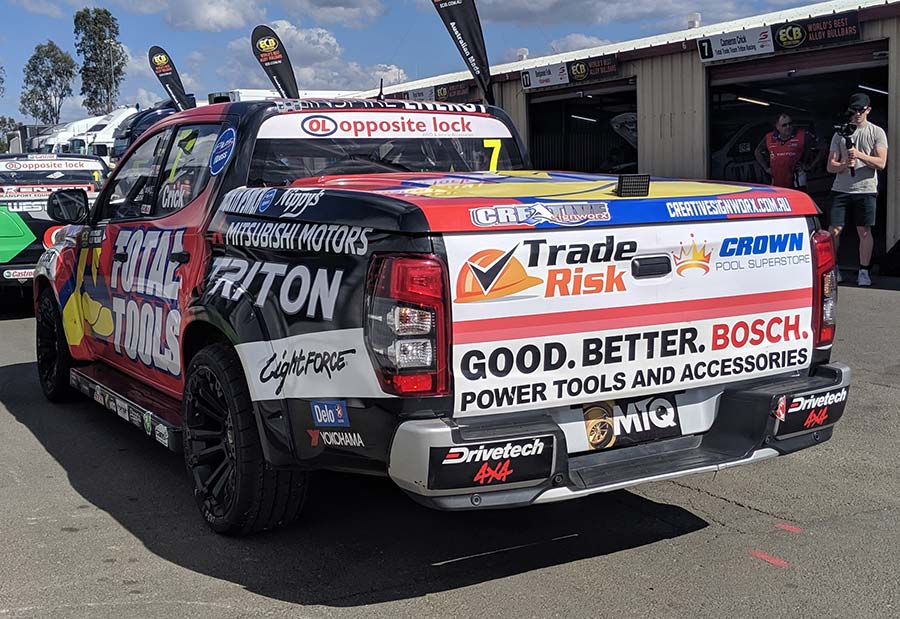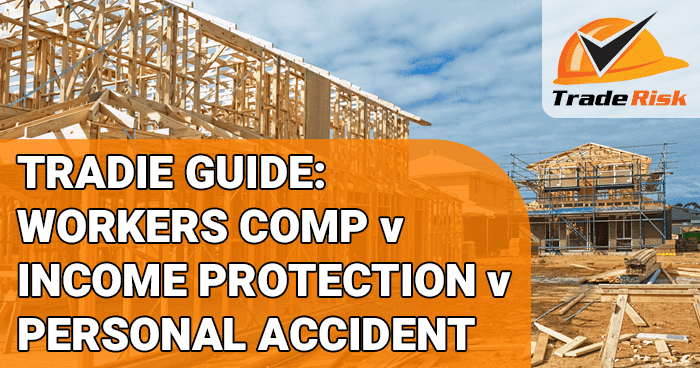If there’s one area of insurance that trips up a lot of tradies, and other business owners for that matter, it’s insurance related to income.
Specifically we’re talking about workers compensation, income protection and personal accident and/or sickness insurance.
Tradies are often confused about what the differences are between them, which ones they do or don’t need, and what they actually do for you.
In this guide, we’re setting out to answer this question once and for all.
If you don’t have ten minutes to read this entire guide, click here to jump straight to our 30 second explanation.
Feel free to skip to the section that is relevant to you. We find that the “Which policy is right for me” section is particularly useful if you don’t want to read the entire guide.
- What does each policy cover?
- Do I only need one type of cover?
- Which policy is right for me?
- Using income protection and personal accident together
- State differences
- Where to obtain advice
- Common questions
The 30 second version
Here’s a quick summary of the three different types of cover.
Workers Compensation:
- Typically administered by the state and territory governments
- Mandatory if you employ staff
- Designed to cover your staff, not you as the company owner (some exceptions)
- Typically not available via insurance brokers (depending on your state)
Income Protection:
- Offered by life insurance companies
- Distributed via financial advisers and planners
- Can replace up to 75% of your income whilst unable to work due to injury or illness
- Is mandatory for self-employed workers on certain worksites
- Only covers your own income, and not your workers
- Typically has a lot of different options and can be very comprehensive
Personal Accident and Sickness:
- Offered by general insurance company
- Distributed via insurance brokers
- Can replace up to 85% of your income whilst unable to work due to injury or illness (depending on options)
- Is mandatory for self-employed workers on certain worksites
- Only covers your own income, and not your workers
- Typically has fewer options than income protection, and less comprehensive overall
What does each policy cover?
If you’ve already read through our 30 second version you should be familiar with the basics, but we’ll now go into greater detail on each cover and how they work for a tradie or trade business owner.
Workers Compensation
Workers compensation is a mandatory form of insurance that must be taken out by employers across Australia.
The policy is designed to protect your employees in the event that they suffer an injury or illness that is related to their work.
Typically we think of claims involving injuries suffered at work, but it can cover injuries away from the office or worksite if they still relate to the work.
As workers compensation is managed at a state government level, the rules and coverage do vary from state to state.
Broadly speaking, workers compensation will cover the following:
- Weekly benefits for lost income
- Lump sum payments
- Medical expenses
- Death benefits
Weekly benefit
The weekly benefit provided by workers compensation will vary from state to state, but it’s generally not going to cover 100% of your income, and it certainly won’t last forever.
It’s a little difficult to find reliable information on just how long wokers compensation payments can go for, and it does vary by state, but a common timeframe mentioned online is 130 weeks, which is around 18 months.
Lump sum payments
For serious injuries or illnesses, especially where the worker is unlikely to return to work after the weekly benefits have been exhausted, the worker may receive a lump sum amount.
This amount can vary greatly based on the state as well as the seriousness of the injury or illness.
Medical expenses
One of the major benefits of workers compensation, and what really differentiates it from income protection, is that it covers medical expenses.
Depending on the state, workers comp will generally cover all reasonable medical expenses sustained by a tradie on the job.
Death benefit
The worst outcome for any workplace incident is death. Workers compensation will generally pay a lump sum in the event of the death of a worker, which the amount varying depending on the state.
Income Protection
Unlike workers compensation which pays benefits in a variety of different ways, income protection is a more pure form of income replacement insurance.
Income protection insurance can replace up to 75% of a tradies income whilst they are unable to work due to injury and illness.

Some policies might also include an option known as “specified injury benefit” where the policy will pay a lump sum for certain injuries.
The amount will vary depending on the injury. For example a lost thumb might pay a small amount, whilst the loss of two full limbs would pay a lot more.
Each policy will have a range of options for the benefit period, waiting period and benefit amount.
The benefit period is the maximum length of time you will receive monthly benefits for whilst you’re unable to work. This could be 2 years, 5 years or all the way through to age 65. The longer the benefit period, the more the policy will cost.
The waiting period is the length of time you must be unable to work for before you are able to claim. There can be a wide range of options, but common waiting periods include 14 days, 30 days and 60 days. The longer the waiting period, the less the policy will cost.
The benefit amount is how much you will be paid each month. This is generally capped at 75% of your income, and you will need to provide evidence of the income in the form of tax returns or similar.
Income protection is never mandatory at a government level in the same way that workers compensation is, however many building contractors will have their own requirements.
Some building companies will require that all subcontractors and self-employed tradespeople on their site hold their own income protection insurance.
You’ll need to show them evidence of your insurance in the form of a certificate of currency.
Personal Accident and Sickness
This form of insurance comes in many different names, but it’s generally referring to the same thing.
Some of the names include personal accident and sickness insurance, accident and illness insurance, illness and injury insurance etc.
It is very similar to income protection insurance in many ways. It will have a waiting period, a benefit period and a benefit amount.
Broadly speaking it will be less comprehensive than income protection, and it will also have reduced options for the benefit period. Whilst income protection can pay up to age 65, personal accident will generally be no greater than 5 years.
Whilst most policies will cover both injury and illness, there are options to cover only injury, which will result in a lower premium.
Personal accident insurance can also include a lump sum option, sometimes referred to as “capital benefits”.
This allows a tradie to choose a lump sum amount that they will receive in the event of a critical injury or death.
You should refer to the individual policies for more information about the options for lump sum payments and when they are paid.
Do I only need one type of cover?
That depends on your individual circumstances and business structure.
A general rule of thumb would be as follows:
Sole trader (with no employees):
- Won’t require workers compensation
- Could have either income protection or personal accident, but not both*
Pty Ltd company with no employees besides yourself:
- Workers compensation requirement will vary depending on the state
- Could have either income protection or personal accident, but not both*
Pty Ltd company with employees:
- Workers compensation will be mandatory
- Could have either income protection or personal accident, but not both*
* Although you wouldn’t generally have both income protection and personal accident cover, there are strategies that involve both covers. We’ll cover this in more detail later in this guide.
For other business structures, such as partnership and trusts, we recommend speaking with one of our team for more personalised advice.
Which policy is right for me?
This depends a few different factors:
- Your business structure (sole trader, company, etc)
- The state your business is based in
- The level of importance you place on protecting yourself
The previous section covered the requirements for the various business structures.
Broadly speaking, if you’re a sole trader then income protection or personal accident is what you need.
If you employ staff, workers compensation is mandatory for your staff, and either income protection or personal accident to cover yourself.
This can vary from state to state however. In Queensland for example, workers compensation does not cover directors of the company, even if they are actively working in the business.
In that case, as a trade business owner in Queensland you’d also need your own income protection or personal accident to cover yourself.
In New South Wales on the other hand, working directors are covered under workers compensation, so potentially you could go without income protection.
That brings us to the third point, which is how important protecting your income is to you. If you want comprehensive protection, you’d never rely solely on workers compensation.

Workers compensation won’t keep paying you each month forever, but an income protection policy with an age 65 benefit period will keep paying you every month until retirement age.
With regards to income protection V personal accident, it is generally considered that income protection is the comprehensive level of cover. It’s also the more expensive option in most cases, but that’s no surprise with the greater level of cover being provided.
There is no real right or wrong answer on whether you should have income protection or personal accident. Income protection provides greater coverage, but personal accident can also be good value for money.
Either way, both policies are going to provide additional coverage compared to relying solely on workers compensation insurance.
Using income protection and personal accident insurance together
Usually you’d never have both income protection and personal accident insurance, as both policies cover essentially the same thing.
Importantly, income is something that you cannot double insure. For example if you have an income protection policy with a benefit amount of $4,000 a month and a personal accident policy for $2,000 a month, you will not be paid $6,000 a month in the event of a claim.
There are some strategies that do combine the two covers in a way where they don’t overlap however. It isn’t exactly common, but it is possible.
With personal accident insurance typically being cheaper and less comprehensive, you might have this type of policy setup for short-term claims, and a more comprehensive income protection policy setup for longer term claims.

For example you might have a personal accident policy with a seven day waiting period and a six month benefit period, along with an income protection policy that has a six month waiting period and an age 65 benefit period.
If you suffered an injury or illness that left you unable to work, you’d claim initially on your personal accident policy which kicked in after seven days. It would run out after six months, but then you’d claim on your income protection policy that had the six-month benefit period.
Why would you do this? There are various reasons, but a good quality income protection policy with a seven-day waiting period would be very expensive, whist personal accident insurance is not available with an age 65 benefit period.
By having both policies working together (but importantly, not overlapping) you can get the best of both worlds.
It does mean paying for two separate insurance policies however, so it’s really for those wanting a very comprehensive level of cover rather than someone with the primary objective of saving money.
State differences
Whilst income protection and personal accident insurance are no different regardless of which Australian state or territory you are based in, workers compensation is a completely different story.
For starters, the way that you obtain cover in each state can be different.
In Queensland for example the only way to obtain cover is via the government-owned WorkCover. In some other states, such as WA, you can obtain cover via an insurance broker or direct from an insurer.
So if your trade business was based in WA you could have a single insurance broker looking after all of your business insurance needs including workers compensation, whilst in Queensland you’d have WorkCover looking after the compensation and a broker looking after the rest.
The specifics of the cover will also vary from state to state. This includes the amount that is paid as a monthly benefit and the amounts that may be paid as a lump sum.
Finally, which companies actually need cover can also vary. For example in Queensland, company directors are not covered by workers compensation, so you only need cover for your company if you employ additional staff.
This differs to New South Wales, where a working director is covered by workers compensation, and it would be mandatory to have cover in place.
Where to obtain advice
This will depend on the type of cover you’re considering, and in the case of workers compensation, which state you are based in.
For income protection insurance you should speak with a financial adviser or planner.
For personal accident insurance you should speak with an insurance broker, such as Trade Risk.
For workers compensation insurance it will depend on which state you are based in. We’ve put together this list of contacts which shows you who to contact in each state.
Common questions
Although this guide is quite comprehensive, no doubt plenty of trade business owners will still have many more questions.
As such questions come up, we’ll be adding them along with our answers below. If you have a question you’d like answered, please call us on 1800 808 800 or contact us online.
Here at Trade Risk we are insurance brokers, and therefore the only form of cover that we can provide advice and cover for is personal accident insurance.
We do have a relationship with a financial adviser who can assist with income protection however, and we’re happy to point you in the right direction for workers compensation.
Does workers compensation cover me or only my workers?
This depends on which state you are located in.
In Queensland it will only cover your workers, and not you as a director of the business.
NSW is different however, where you are covered as a working director.
It’s best to check with the relevant authority for your state or territory. Check out this list of relevant contacts.
Does workers compensation cover my subcontractors?
This can be a grey area. If the subcontractor is a company, there is no requirement for workers compensation. The company that is subcontracting to you would have make their own arrangements for their employees.
If the subcontractor is a sole trader, they could potentially be deemed as worker of yours and you may have to include them in your workers compensation insurance.
Have any questions of your own? Call us on 1800 808 800 to speak with an expert or contact us online.




